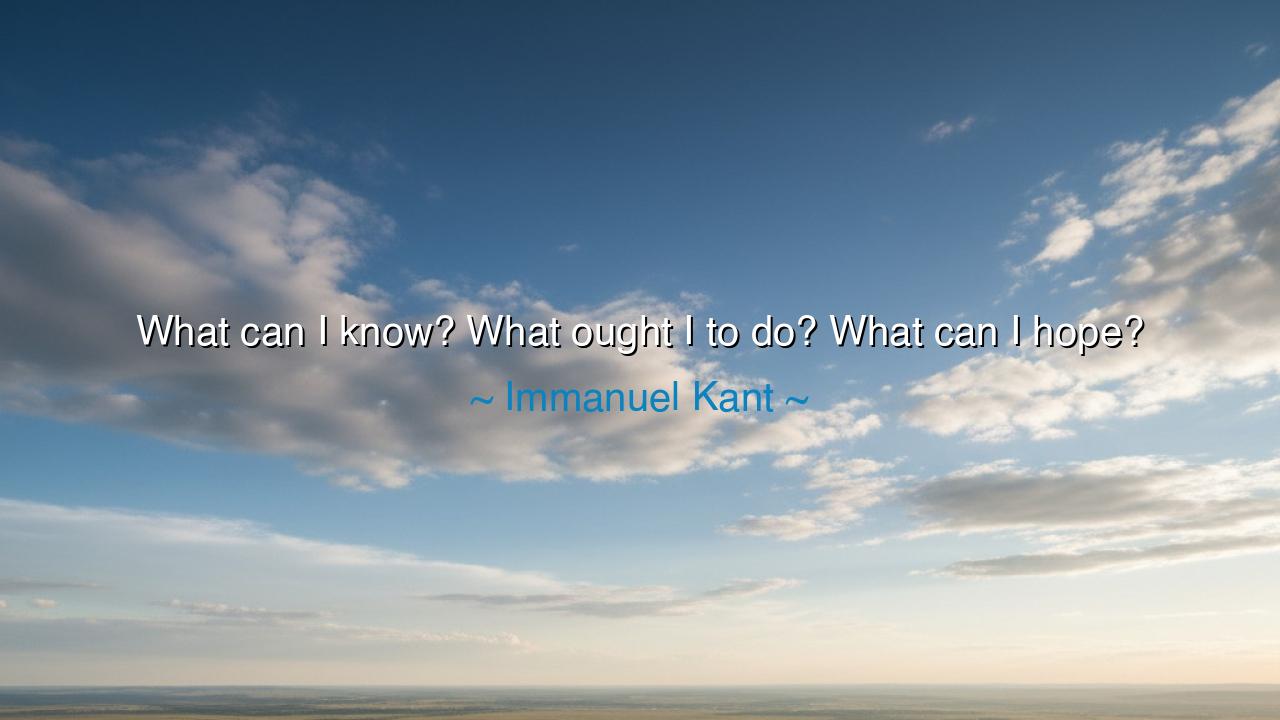
What can I know? What ought I to do? What can I hope?






In the profound and eternal words of Immanuel Kant, the questions — “What can I know? What ought I to do? What can I hope?” — rise like pillars in the temple of human thought. They are not merely philosophical inquiries; they are the three great questions of existence, the compass points by which every soul must navigate its brief and luminous passage through life. Each question pierces to the heart of our being, demanding not only knowledge, but wisdom, courage, and faith. Kant’s words remind us that all the vast oceans of human inquiry, from science to art to morality, return finally to these three fountains: truth, duty, and hope.
The meaning of these questions reaches beyond philosophy and into the fabric of life itself. “What can I know?” calls us to humility before the mystery of reality. It reminds us that knowledge, though vast, has its limits — that truth is both a treasure and a horizon ever receding as we approach. To know is to seek, to question, to observe — yet also to accept that not all things are ours to understand. This first question forms the foundation of reason, urging us to discern what is real from what is illusion, to test our beliefs not with arrogance, but with honesty. For without truth, the mind wanders in darkness; but without humility, truth itself becomes corrupted.
The second question, “What ought I to do?”, is the heartbeat of morality. Here Kant calls not to the intellect, but to the conscience — to that inner voice which whispers in the silence of our choices. It is a call to action, to responsibility, to righteousness. Knowledge without duty is vanity, but duty without knowledge is blindness. Thus, Kant teaches that to live well is to align action with moral law, not as dictated by power or desire, but by the inner sense of justice that dwells in every human heart. This is the question that built civilizations, guided saints, and tempered kings. It asks not what we want to do, but what we must do to remain true to ourselves and to the eternal order of goodness.
The third question, “What can I hope?”, is perhaps the most tender — and the most divine. It speaks to the longing of the human spirit, the yearning that rises even when knowledge fails and duty grows heavy. To hope is to trust that life has meaning beyond its trials, that goodness and truth are not fleeting shadows but eternal realities. In Kant’s vision, hope bridges the finite and the infinite — it allows man to stand in the face of uncertainty with courage, to labor in faith even when results are unseen. Hope is not mere optimism; it is the moral courage to believe in the unseen good, to act as though light exists even in the midst of darkness.
The origin of these questions lies at the core of Kant’s philosophy, which sought to unite the realms of reason and morality, knowledge and faith. In his Critique of Pure Reason and later works, Kant wrestled with the boundaries of what the human mind could truly comprehend. He recognized that while knowledge gives us power over the world, it cannot tell us how to live within it. Thus, his three questions formed a holy trinity of the human condition: To know is the task of the mind, to act rightly is the duty of the will, and to hope is the salvation of the heart. Together, they define the full measure of human existence — the search for truth, the discipline of virtue, and the courage to believe in something higher than oneself.
This triad finds reflection in the lives of many who walked before us. Consider Socrates, who in ancient Athens spent his life seeking truth through questioning, lived in accordance with his moral principles, and faced death with serenity born of hope. He knew what he could know — the limits of his wisdom. He did what he ought — remained faithful to his conscience even before the law. And he hoped — not in glory, but in the immortality of the soul. In his trial, when offered life at the cost of his principles, he chose death, saying, “The unexamined life is not worth living.” Thus, his life embodied the very essence of Kant’s eternal triad: reason, virtue, and faith.
And so, my listener, let this be the lesson: the three questions of Kant are not for scholars alone, but for all who wish to live wisely and well. Each morning, ask yourself: What can I know today? — and seek truth without fear. What ought I to do? — and act with integrity, even when the path is hard. What can I hope? — and hold fast to that inner light which no darkness can extinguish. For the one who seeks truth becomes wise; the one who acts rightly becomes just; and the one who hopes becomes unbreakable.
Thus, in the end, Kant’s words are not cold philosophy, but a map of the soul. They remind us that to live as a human being is to dwell between the known and the unknown, between the duty of the moment and the mystery of eternity. To know, to act, to hope — these are the three fires by which humanity lights its way through the night. Tend them, and your life shall not drift like dust in the wind, but burn bright as a beacon to those who come after.






AAdministratorAdministrator
Welcome, honored guests. Please leave a comment, we will respond soon